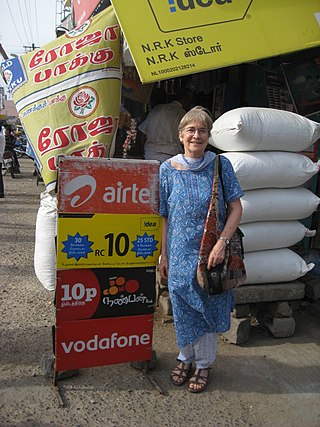Related Research Articles

A peasant is a pre-industrial agricultural laborer or a farmer with limited land-ownership, especially one living in the Middle Ages under feudalism and paying rent, tax, fees, or services to a landlord. In Europe, three classes of peasants existed: non-free slaves, semi-free serfs, and free tenants. Peasants might hold title to land outright, or by any of several forms of land tenure, among them socage, quit-rent, leasehold, and copyhold.

The Stolypin agrarian reforms were a series of changes to Imperial Russia's agricultural sector instituted during the tenure of Prime Minister Pyotr Stolypin. Most, if not all, of these reforms were based on recommendations from a committee known as the "Needs of Agricultural Industry Special Conference," which was held in Russia between 1901 and 1903 during the tenure of Minister of Finance Sergei Witte.
Transnationalism is a research field and social phenomenon grown out of the heightened interconnectivity between people and the receding economic and social significance of boundaries among nation states.

Metabolic rift is a theory of ecological crisis tendencies under the capitalist mode of production that sociologist John Bellamy Foster ascribes to Karl Marx. Quoting Marx, Foster defines this as the "irreparable rift in the interdependent process of social metabolism". Foster argues that Marx theorized a rupture in the metabolic interaction between humanity and the rest of nature emanating from capitalist agricultural production and the growing division between town and country.

The Centre for Development Studies (CDS), Thiruvananthapuram, Kerala, India is a premier Social Science research institute. It is also a higher education institution providing M.A. course in applied economics and PhD course in economics. The institute is internationally reputed for being a centre for advanced learning in economics. Its main objective is to promote research, teaching and training in disciplines relevant to development.
Rural economics is the study of rural economies. Rural economies include both agricultural and non-agricultural industries, so rural economics has broader concerns than agricultural economics which focus more on food systems. Rural development and finance attempt to solve larger challenges within rural economics. These economic issues are often connected to the migration from rural areas due to lack of economic activities and rural poverty. Some interventions have been very successful in some parts of the world, with rural electrification and rural tourism providing anchors for transforming economies in some rural areas. These challenges often create rural-urban income disparities.

Stephen Gill, FRSC is Distinguished Research Professor of Political Science at York University, Toronto, Ontario, Canada. He is known for his work in International Relations and Global Political Economy and has published, among others, Power and Resistance in the New World Order, Power, Production and Social Reproduction, Gramsci, Historical Materialism and International Relations (1993), American Hegemony and the Trilateral Commission (1990) and The Global Political Economy: Perspectives, Problems and Policies.

In historiography, rural history is a field of study focusing on the history of societies in rural areas. At its inception, the field was based on the economic history of agriculture. Since the 1980s it has become increasingly influenced by social history and has diverged from the economic and technological focuses of "agricultural history". It can be considered a counterpart to urban history.
The Journal of Peasant Studies, subtitled Critical Perspectives on Rural Politics and Development, is a bimonthly peer-reviewed academic journal covering research into the social structures, institutions, actors, and processes of change in the rural areas of the developing world. It is published by Routledge and the editor-in-chief is Saturnino "Jun" Borras Jr..
Henry Bernstein is a British sociologist and Emeritus Professor of Development Studies at the University of London: School of Oriental and African Studies. He has worked for several decades on the political economy of agrarian change, social theory, peasant studies, land reform, and the rural economy in South Africa.
The Journal of Agrarian Change is a peer-reviewed academic journal established in 2001 covering agrarian political economy. The journal publishes historical and contemporary studies of the social relations and dynamics of production, power relations in agrarian formations and ownership structures and their processes of change.
Tom Brass is an academic who has written widely on peasant studies. For many years he was at the University of Cambridge as an affiliated lecturer in their Faculty of Social and Political Sciences and at Queens' College, Cambridge as their Director of Studies of the Social and Political Sciences. For many years he was an, and then the, editor of the Journal of Peasant Studies. Murray reports Brass as being "dismissive of the cultural turn in peasant studies" and the rise of post-modern perspectives and his notion that this has been a conservative process and that it has lent support to neoliberalism.
The Brenner debate was a major debate amongst Marxist historians during the late 1970s and early 1980s, regarding the origins of capitalism. The debate began with Robert Brenner's 1976 journal article "Agrarian class structure and economic development in pre-industrial Europe", published in the influential historical journal Past & Present.
Political economy in anthropology is the application of the theories and methods of historical materialism to the traditional concerns of anthropology, including but not limited to non-capitalist societies. Political economy introduced questions of history and colonialism to ahistorical anthropological theories of social structure and culture. Most anthropologists moved away from modes of production analysis typical of structural Marxism, and focused instead on the complex historical relations of class, culture and hegemony in regions undergoing complex colonial and capitalist transitions in the emerging world system.
Agrarian socialism is a political ideology that promotes social ownership of agrarian and agricultural production as opposed to private ownership. Agrarian socialism involves equally distributing agricultural land among collectivized peasant villages. Many agrarian socialist movements have tended to be rural, locally focused, and traditional. Governments and political parties seeking agrarian socialist policies have existed throughout the world, in regions including Europe, Asia, North America, Latin America, and Africa.

Barbara Harriss-White is an English economist and emeritus professor of development studies. She was trained in geography, agricultural science, agricultural economics and self-taught in development economics. In the 1990s, she helped to create the multi- and inter- disciplinary thematic discipline of development studies in Oxford Department of International Development; and in 2005-7 founded Oxford's Contemporary South Asia Programme. She has developed an approach to the understanding of Indian rural development and its informal economy, grounded in political economy and decades of what the economic anthropologist Polly Hill called ‘field economics’.

French peasants were the largest socio-economic group in France until the mid-20th century. The word peasant, while having no universally accepted meaning, is used here to describe subsistence farming throughout the Middle Ages, often smallholders or those paying rent to landlords, and rural workers in general. As industrialization developed, some peasants became wealthier than others and drove investment in agriculture. Rising inequality and financial management in France during the late 18th century eventually motivated peasants to revolt and destroy the feudal system. Today peasants could no longer be said to exist as an economic or social group in France, although many attempts have been made to honor and preserve this traditional way of life.
Landlessness is the quality or state of being without land, without access to land, or without having private ownership of land. Although overlapping considerably, landlessness is not a necessary condition of poverty. In modern capitalist societies, individuals may not necessarily privately own land yet still possess the capital to obtain an excess of what is necessary to sustain themselves, such as wealthy individuals who rent expensive high-rise apartments in major urban centers. As such, landlessness may not exist as an immediate threat to their survival or quality of life. This minority of landless individuals as sometimes been referred to as the "landless rich." However, for the majority of landless people, including the urban poor and those displaced into conditions of rural-to-urban migration, their condition of landlessness is also one of impoverishment, being without the capital to meet their basic necessities nor the land to grow their own food, keep animals, or sustain themselves. During times of economic prosperity in modern capitalist societies, the liabilities of landlessness may not be noticeable, especially to the wealthy, but during times of economic failure and rising unemployment, the liabilities of landlessness become more visible.
Sheila Bhalla was a Canadian-Indian labor economist and trade union activist.

Environmental conflicts or ecological distribution conflicts (EDCs) are social conflicts caused by environmental degradation or by unequal distribution of environmental resources. The Environmental Justice Atlas documented 3,100 environmental conflicts worldwide as of April 2020 and emphasised that many more conflicts remained undocumented. Parties involved in these conflicts include locally affected communities, states, companies and investors, and social or environmental movements; typically environmental defenders are protecting their homelands from resource extraction or hazardous waste disposal. Resource extraction and hazardous waste activities often create resource scarcities, pollute the environment, and degrade the living space for humans and nature, resulting in conflict. A particular case of environmental conflicts are forestry conflicts, or forest conflicts which "are broadly viewed as struggles of varying intensity between interest groups, over values and issues related to forest policy and the use of forest resources". In the last decades, a growing number of these have been identified globally.
References
- ↑ Bernstein, Henry; Byres, Terence J. (2001). "From Peasant Studies to Agrarian Change". Journal of Agrarian Change. 1 (1): 1–56. Bibcode:2001JAgrC...1....1B. doi:10.1111/1471-0366.00002. S2CID 149454023.
- ↑ Sajadian, China (2020) Critical Agrarian Studies, International Encyclopedia of Human Geography, 10.1016/B978-0-08-102295-5.10456-1, (17-23).
- ↑ Jones, Eric Lionel, and Stuart Joseph Woolf, eds. (2013) Agrarian Change and Economic Development: The Historical Problems. United Kingdom, Taylor & Francis
- ↑ Grigg, D. (1979). Ester Boserup's theory of agrarian change: a critical review. Progress in human geography, 3(1), 64-84.